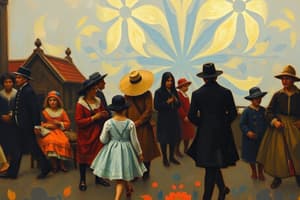Podcast
Questions and Answers
What do cultural practices encompass?
What do cultural practices encompass?
- Only symbolic culture
- Only rituals and beliefs
- Only material culture
- Various aspects of daily life, including social interactions, rituals, beliefs, and artistic expressions (correct)
What is one of the functions of cultural practices?
What is one of the functions of cultural practices?
- To learn mathematical concepts
- To shape individual and group identities (correct)
- To preserve cultural heritage
- To develop scientific theories
How are cultural practices influenced in modern times?
How are cultural practices influenced in modern times?
- Only through globalization
- Only through social media
- Only through technology
- Through both globalization and digital technologies (correct)
Flashcards are hidden until you start studying
Study Notes
Definition and Scope
- Cultural practices refer to the shared behaviors, customs, and traditions of a particular group of people, shaped by their cultural background, history, and values.
- They encompass various aspects of daily life, including social interactions, rituals, beliefs, and artistic expressions.
Types of Cultural Practices
- Material culture: tangible objects and artifacts that reflect a culture's values and beliefs (e.g., art, architecture, clothing, food).
- Immaterial culture: intangible aspects of culture, such as language, customs, and traditions (e.g., music, dance, storytelling).
- Symbolic culture: symbols, signs, and codes that convey meaning within a culture (e.g., flags, national anthems, logos).
Functions of Cultural Practices
- Socialization: cultural practices help individuals learn and internalize cultural norms and values.
- Identity formation: cultural practices shape individual and group identities, fostering a sense of belonging and community.
- Communication: cultural practices facilitate communication and expression within and between groups.
- Preservation: cultural practices help preserve cultural heritage and traditions.
Impact of Cultural Practices
- Social cohesion: cultural practices can promote unity and social cohesion within a group.
- Cultural diversity: cultural practices can contribute to the richness and diversity of human experiences.
- Power dynamics: cultural practices can also perpetuate social inequalities and reinforce dominant power structures.
Cultural Practices in Modern Times
- Globalization: cultural practices are increasingly influenced by globalization, leading to cultural exchange, hybridization, and homogenization.
- Digital age: digital technologies are transforming cultural practices, enabling new forms of expression, communication, and community-building.
- Cultural preservation: efforts to preserve and promote cultural heritage and traditional practices are becoming more important.
Definition and Scope
- Cultural practices encompass shared behaviors, customs, and traditions of a group, shaped by cultural background, history, and values, and include aspects of daily life such as social interactions, rituals, beliefs, and artistic expressions.
Types of Cultural Practices
- Material culture includes tangible objects and artifacts that reflect a culture's values and beliefs, such as art, architecture, clothing, and food.
- Immaterial culture consists of intangible aspects of culture, including language, customs, and traditions, such as music, dance, and storytelling.
- Symbolic culture involves symbols, signs, and codes that convey meaning within a culture, including flags, national anthems, and logos.
Functions of Cultural Practices
- Socialization: cultural practices help individuals learn and internalize cultural norms and values.
- Identity formation: cultural practices shape individual and group identities, fostering a sense of belonging and community.
- Communication: cultural practices facilitate communication and expression within and between groups.
- Preservation: cultural practices help preserve cultural heritage and traditions.
Impact of Cultural Practices
- Social cohesion: cultural practices can promote unity and social cohesion within a group.
- Cultural diversity: cultural practices contribute to the richness and diversity of human experiences.
- Power dynamics: cultural practices can perpetuate social inequalities and reinforce dominant power structures.
Cultural Practices in Modern Times
- Globalization: cultural practices are influenced by globalization, leading to cultural exchange, hybridization, and homogenization.
- Digital age: digital technologies are transforming cultural practices, enabling new forms of expression, communication, and community-building.
- Cultural preservation: efforts to preserve and promote cultural heritage and traditional practices are becoming increasingly important.
Studying That Suits You
Use AI to generate personalized quizzes and flashcards to suit your learning preferences.





